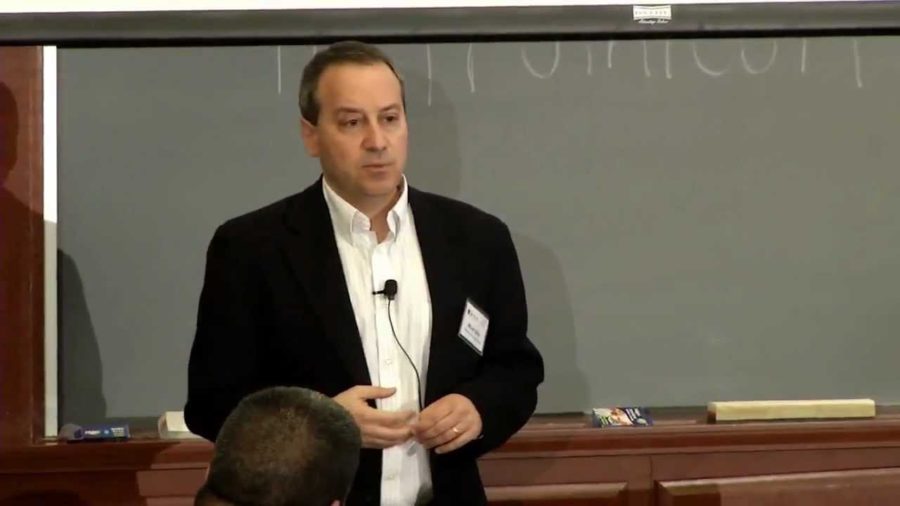Ethan Zuckerman: So, thanks everybody. We are lucky enough at this point to hand moderating duties off to two sets of capable hands. To my right, the lovely Micah Sifry, late of Personal Democracy Forum, Harvard’s Kennedy School, a million and one other things. He has a lovely little book on WikiLeaks that I recommend. Over to my left, the lovely Zephyr Teachout, most lately of Fordham Law School, involved with any manner of wonderful things. Early Global Voices contributor, which I’m very grateful for. Longtime fellow Berkman fellow associate, etc. With no further ado, on to you guys.
Micah Sifry: Thank you, Ethan. Okay, so I apologize on behalf of the Harvard Law School, the entire Harvard system, for the lack of proper caffeine. There wasn’t caffeine there. Did anybody get caffeine? I didn’t get any caffeine.
So we’re going to have to— You know, we all store some extra caffeine in the lymph nodes. Call on it now. This is the last session of the day. I know there’s always a danger that energy can flag, but I think we can bring it back and bring things to a strong conclusion.
So before I bring up our four presenters who are going to be talking about interventions for institutions, I’d like to just sort of open first by just picking up on the power of metaphors that Christian Sandvig was offering us at the beginning of the last session where he talked about the different ways of thinking about the Internet and how those different frames, those metaphors, maybe lead to different ideas about how to intervene on this problem.
But I actually want to go beyond the way we think about the Internet to think about this whole question we’ve been wrestling with, which is you know, our information system, and to take a metaphor that my friend Craig Newmark (who’s up there) likes to say, which is that the press or the media is the immune system of democracy. And I think in one form or another that is what we’ve been talking about here, is this system of people, ideas, interactions, institutions, that play a role in how we gather and filter information and make decisions as a country or as a system, as a democracy.
And I also want to just flag that I thought Ethan’s suggestion that we hunt for examples or we keep asking ourselves how tractable is this approach, that we recognize that some of us like to work on the thing that will help between now and November, like Kathleen Hall Jamieson’s suggestion, very actionable, to try and reduce the amount of deceptive TV ads that air. And others want to look more broadly at institutional or infrastructural kinds of responses that maybe strengthen that immune system beyond one election cycle or particular political event.
I would like to propose just as a transition that you know, there are individual approaches. We heard a few already. I’d like to mention two more. One a very interesting new book by the former director the Sunlight Labs Clay Johnson called The Information Diet, which suggests that part of the solution here is for individuals, the same way that we’re all tempted to eat bad calories that aren’t nutritious because our bodies are wired to respond to things like sugar, that we can also perhaps train ourselves to kind of be careful about what information we consume, and in this digital age also pay attention to how we consume information online.
So that metaphor of the individual trying to diet I think could be a helpful one. I’d like to offer another one, which is that we also think about the role that individuals can play themselves as you know, asking better questions, as people whether we are professionally in that role as journalists or as amateurs, as just citizens encountering situations where a timely question asked can make a difference, and that personally I’m looking for ways to increase the supply of good questions and to reward, whether it’s professional journalists or amateurs, when they do ask good questions. That perhaps we can stimulate as a society that practice.
But just to go back to this metaphor of the immune system. It seems to me that if we take that as an operating metaphor then we do have to admit that bad information, misinformation, is with us to stay, the same way that bugs and viruses are also with us to stay. We’re never going to stamp them out, we just have to develop vaccines or develop ways of keeping the body healthy, but understanding that they are too part of the system.
And so I want to suggest that maybe as we think about infrastructure, that what we’re talking about here, institutional responses, is a kind of public health approach to this problem of misinformation, truthiness. And that the same way that it took modern society a while to figure this out, that actually disease isn’t just something that floats in the air but it’s for example in dirty water, and thus we start investing in things like clean water and sewage systems, that we also have to think in the same way about what sort of infrastructure do we need to get a healthier information ecosystem?
And I don’t have all the answers but maybe some of the next group of people who are presenting can offer us some in this context. And so just hold that thought of public health approach, strengthening the immune system of democracy. And I’d like to bring up now on our first speaker. We’re going to go in the order of the people listed in the program.
Further Reference
Truthiness in Digital Media event site
